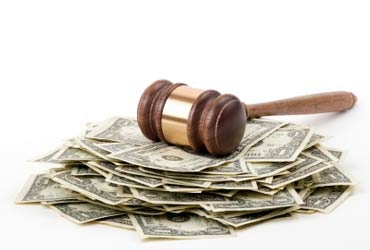INSTITUTE INDEX: Justice at risk from big money politics

In the last 15 years, factor by which fundraising for state judicial races has increased nationwide: more than 2
Amount spent on state judicial campaigns from 1990 to 1999: $83.3 million
From 2000 to 2009: $206.9 million
Ratio of direct campaign contributions from business interests compared to contributions from other groups in state supreme court races from 2000 to 2009: about 50-50
Percent of paid TV advertising in those races that came from business groups, which have dominated independent expenditures: 90
According to a study of the relationship between contributions to state supreme court candidates and the votes cast on the court, portion of the time that a justice who receives half of his or her contributions from business groups votes in favor of business interests: almost 2/3
In 10 high-profile state supreme court elections in 2012 and 2013 where outside spending was a factor, amount spent by independent groups: $11.7 million
Portion of that money which originated from outside the election state: at least 1/3
Number of states where out-of-state money likely helped decide the outcome of judicial races: 3*
Percent of the outside money spent in those races that could be traced to the battle between trial lawyers and business interests: 75
Amount the U.S. Chamber of Commerce, the leading U.S. business lobby, spent in 2000 trying to influence state supreme court elections in Mississippi, which had a reputation as one of the nation's most plaintiff-friendly jurisdictions: $1 million
Year in which the U.S. Chamber issued what the Wall Street Journal dubbed a "call to arms" to Mississippi voters, referring to the state as a lawsuit "Mecca": 2002
Amount of outside expenditures made in Mississippi's latest Supreme Court race, with most of that going to the winning candidate: $638,077
Amount of that total which came from the D.C.-based American Tort Reform Association, which wants to make it harder for plaintiffs to recover damages in court: more than $350,000
Amount that came from the Virginia-based Law Enforcement Alliance of America, which was founded with support from the National Rifle Association, and which some observers believe has been getting money from the U.S. Chamber: at least $188,000
Percent of the vote won by the Mississippi candidate who benefited most from outside expenditures, even though his opponent raised more in campaign contributions: 58
Amount that independent groups spent to influence North Carolina's supreme court race last year: at least $2.59 million
Percent of that money which came from groups outside the state: over 50
Percent which came from super PACs supporting conservative incumbent Paul Newby: about 88
Despite trailing in the polls during the campaign, percent of the vote Newby ended up winning following a last-minute attack ad against challenger Sam Ervin that one newspaper described as sleazy: 51.9
Amount of money that a group called Justice for All NC spent to help Newby retain his seat: $1.7 million
Percent of Justice for All's money that came from the Washington, D.C.-based Republican State Leadership Committee (RSLC), a group that in 2010 led an effort to elect GOP state legislators in advance of redistricting, which faced challenges in state courts including North Carolina's: 68
Rank of the U.S. Chamber's Institute for Legal Reform among the biggest donors to the RSLC in 2012: 1
Amount that the North Carolina chapter of Americans for Prosperity, a Virginia-based group tied to billionaire industrialists Charles and David Koch, spent on mailers supporting Newby that were sent shortly before the election: $225,000
Total amount outside groups spent on Ervin's behalf: $75,000
Date on which a North Carolina legislator took action to end the state's public judicial financing program at the urging of state budget director Art Pope, a businessman and conservative mega-donor tied to a number of groups that spent heavily to support Newby: 6/12/2013
* North Carolina, Mississippi and Iowa
(Click on figure to go to source.)
Tags
Sue Sturgis
Sue is the former editorial director of Facing South and the Institute for Southern Studies.
